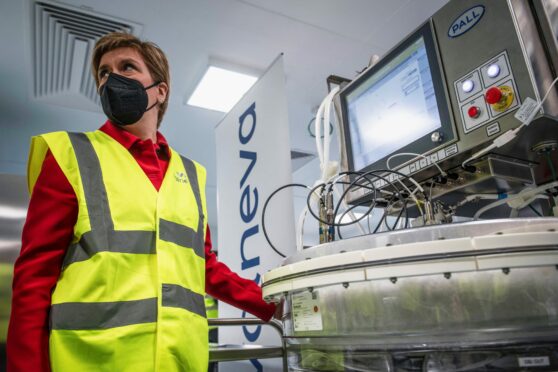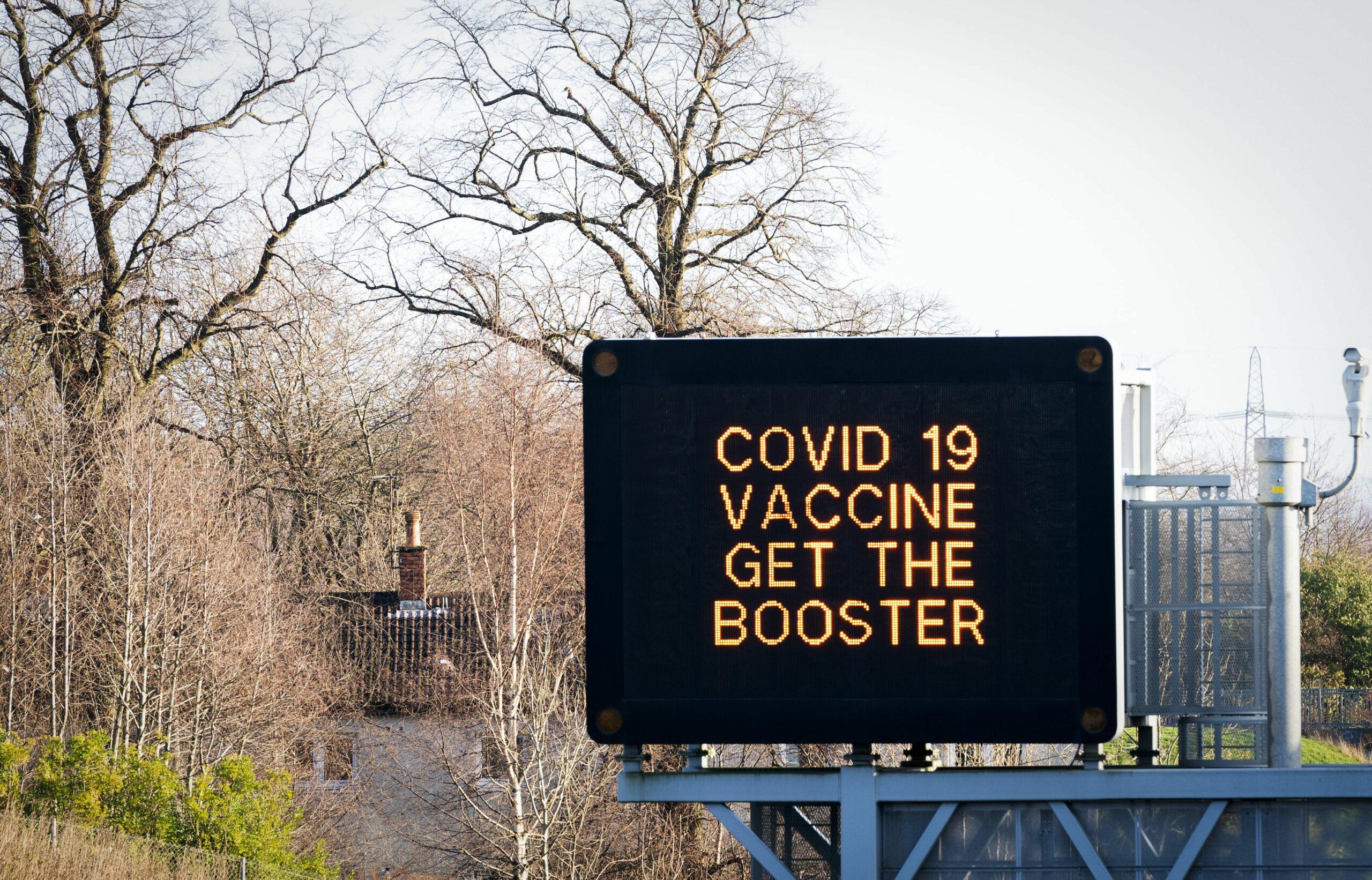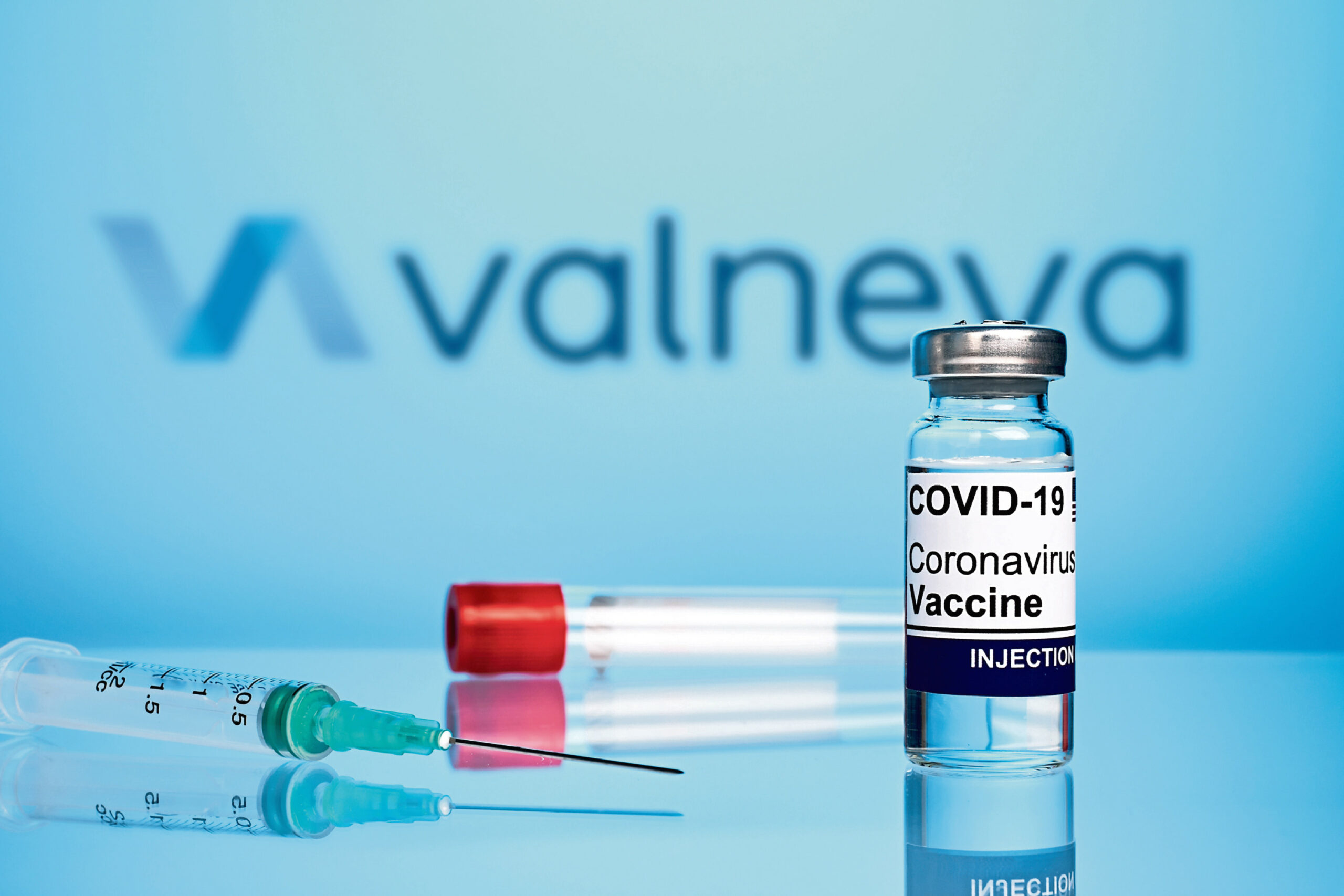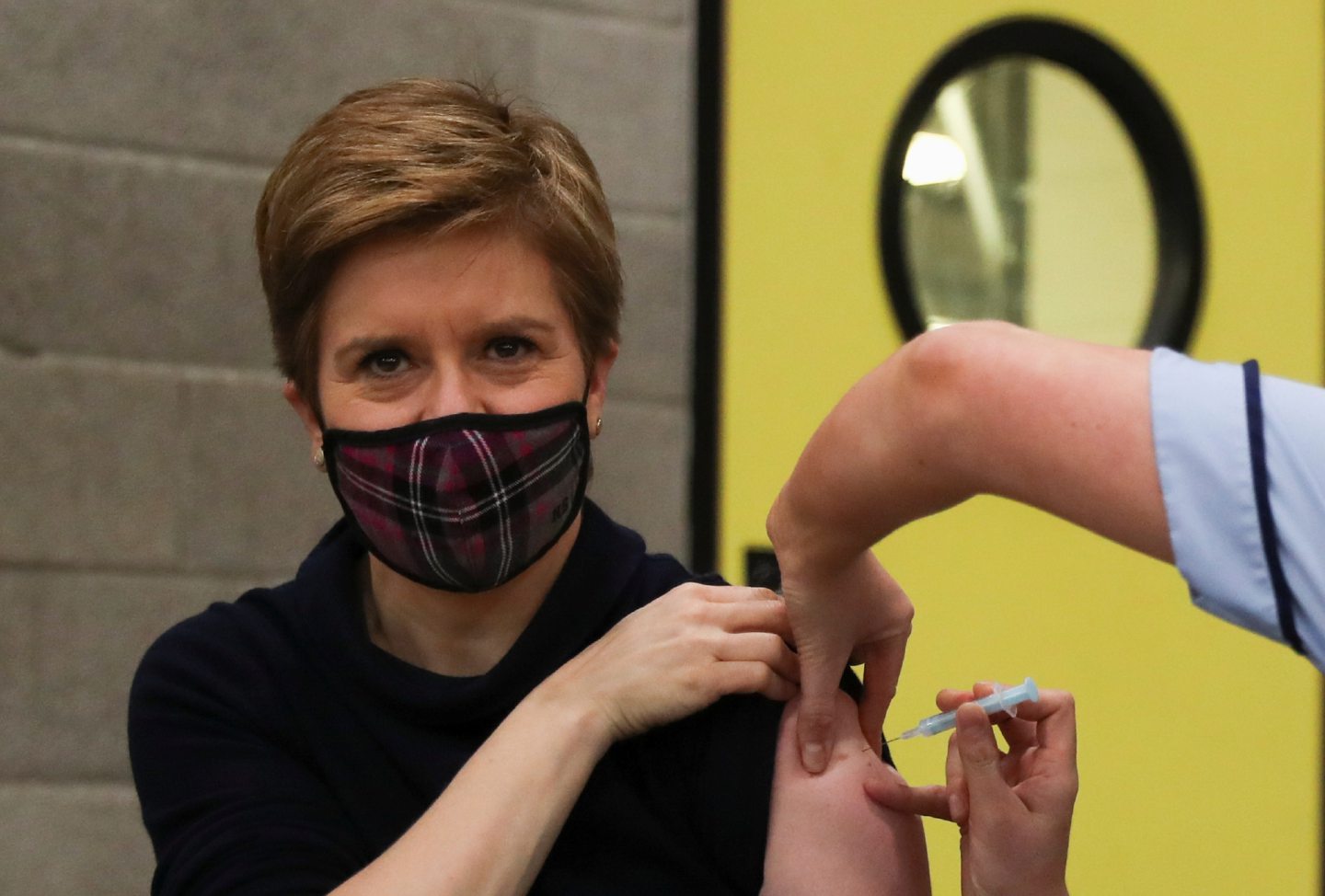
A pharmaceutical firm given millions of pounds by Scottish Enterprise to develop and produce a Covid vaccine has suspended its manufacture.
Scottish Enterprise awarded French firm Valneva £12.5 million specifically to develop and make its Covid vaccine in February after Nicola Sturgeon held talks with chief executive Thomas Lingelbach. Another £7.5m was promised to support development of vaccines for other diseases at the plant in West Lothian.
However, after drawing down £4.3m of the cash, the firm has been forced to halt production of the Covid vaccine after an order for 60 million doses from the European Commission was cut to just 1.25m.
Lingelbach told The Post that manufacture of the Covid vaccine has been suspended after orders from the UK and European Union were slashed. He said: “We have suspended manufacturing following a situation where the order got cut back drastically. Because we have a lot of inventory already produced, and in the absence of further commercial demand, we cannot continue as a small company manufacturing at risk.”
The Scottish plant was set up with the support of £214m in non-refundable payments from the UK Government linked to a deal to supply 100m doses. That order was cancelled in September, however, and there are currently millions of doses in storage with a shelf life of 15 to 24 months.
The first minister visited the plant in March to be briefed on work at the company’s Livingston site, which has 200 staff, and its Covid vaccine VLA2001.
It is the only approved whole-virus vaccine, meaning the live virus is grown in a lab, rendered unable to infect cells, then administered to people over two doses 28 days apart. Research suggests it as effective as the Oxford AstraZeneca jag.
However, Valneva has struggled to sell its existing stock with only the European Commission and Bahrain committing to relatively small orders, leaving around eight million doses in storage, according to Lingelbach.
He blames oversupply of vaccines for a lack of interest in VLA2001. He has urged the Scottish Government to place an order despite the UK Government Vaccines Taskforce buying Covid jags for all four nations.
He said: “It would be very, very nice to have Scotland buying doses from Valneva. It would send a very, very strong signal.”
When Lingelbach was asked if an order from Scottish ministers would protect Scottish jobs, he said: “Of course, yes.”
However, he admitted they would have to bypass the UK Government Vaccines Taskforce.
He said: “Many, many people in Scotland have worked hard on this vaccine and it is a good vaccine. I hope we will find a way to get the vaccine to people in Scotland who want to have it.
“My understanding is there could be ways around it but right now we haven’t reached this point in the discussion.”
Another issue facing Valneva is the age range the vaccine has been approved for in the UK. The Medicines and Healthcare products Regulatory Agency said in April it can be safely administered to people aged 18 to 50 but the latest booster campaign is only for over-50s.
The original order from the UK Government required trials to be conducted in the UK and at the time a mass vaccination of the elderly was ongoing so there weren’t enough older people involved. Valneva has since conducted trials involving over-50s in New Zealand and when the results come in, the age range will likely be raised.
Despite the setbacks, Lingelbach said the funding from Scottish Enterprise had helped expand operations at the Livingston facility and insisted it is a strategic site “with or without Covid”.
“It’s not just a Covid facility,” he said. “Those grants are helping us to further extend and expand activities on site.”
Samir Devani, an equity research analyst at Rx Securities, who advises clients on investment opportunities, said the cancellation of contracts for Covid vaccines had been very damaging for Valneva.
He said: “They’ve got quite a bit of cash in the balance sheet – €330 odd million – so they’re not running out of money anytime soon but they are currently holding unused Covid vaccine worth up to €150m.
“The Scottish Government recognised that the facility employs a lot of people locally and obviously there was a viability question.
“The grants were to keep the plant open and keep employing the Scottish staff there. They do have other vaccines and will probably have to pivot back to those.”
The firm’s latest financial report published last week said the £12.5 million for the Covid programme would have to be repaid if production is halted permanently.
However, Lingelbach remains confident Valneva’s Livingston site will play a role in the ongoing battle against Covid-19. He concedes he doesn’t yet know if the company’s current vaccine will be widely used but his staff are already working on new versions which tackle the latest Omicron variants. They also have the capability to produce a bivalent vaccine which would work against multiple variants.
Lingelbach said: “We have been working on a number of variant adjusted versions.
“We know that our platform is suitable to have customised vaccines against any variant of concern. We have the concept ready, we have achieved proof of concept for Alpha, for Beta, for Delta for Omicron. So we know that our platform works.
“We could start with a so-called bivalent vaccine which contains two antigens but we’re not going to do this, we can’t do it, in the absence of a contractual commitment.”
German-born Lingelbach admits the development of a Covid vaccine has been a “rollercoaster” but insists he has no regrets.

He said: “We should not forget this Covid programme has led to further expanding the site in Scotland.
“We would not have it without Covid and this platform opens up a huge strategic opportunity for the future because it allows us to morph Scotland away from a one-product operation to really becoming a world-class centre of viral manufacturing so as such there are many positive things about it.
“I’m sure I have more grey hairs, I lost more hair but I’m not regretting it.”
He also issued a warning to governments that the current pandemic is not over.
“It may be politically over but it is not scientifically over,” he said.
“Right now we are seeing a quite significant summer wave. I expect to see new variants coming up in the autumn because the virus has shown to be quite smart and intelligent and adjusts itself quite rapidly.
“We had a summer wave last year and then all of a sudden Omicron popped up. I expect to see something similar because we are not at the point where the pandemic reaches a natural end.
“We have seen reinfections over and over again which means the variants are faster than what we can achieve in terms of protections through vaccination and natural infection.
“Hopefully the next variant will not be as severe as Delta was. Hopefully the vaccines will still have a certain level of protection so we can at least prevent severe cases in hospitals. That would be a major achievement.”
Adrian Gillespie, chief executive of Scottish Enterprise, said: “A key objective of our support to Valneva was to anchor one of the world’s largest and most advanced vaccine manufacturing sites here in Scotland.
“This has been achieved, enabling a range of opportunities to export vaccines from Scotland across the world. We will continue to support Valneva to realise the opportunities this world-class asset opens up.”
Scottish Enterprise added no further payments will be made from the £12.5m grant while manufacturing is suspended and they have mechanisms in place to retrieve funding if key milestones are not met.
The Scottish Government said: “Vaccines are procured on a four-nations basis by the UK Vaccines Taskforce. We have no immediate plans for procurement of Covid-19 vaccines outwith the four-nations approach currently in place. The Scottish Government is aware Valneva has suspended work on its Covid-19 vaccine due to reduced orders. Scottish Enterprise has a close working relationship with Valneva and support from Scottish Enterprise helped secure the world-class vaccine manufacturing facility in Livingston. It will continue to engage with Valneva around their future plans.”
The Medicines and Healthcare products Regulatory Agency said: “Approval of the Valneva vaccine has been granted for those aged 18-50 as clinical trial results are currently available for these age groups. However, we have applied a condition to our approval, that data in older subjects over 50 years should be provided to support an indication in older age groups in the future.”
The UK Government declined to comment.
Lingelbach, who blames oversupply of vaccines for a lack of interest in VLA2001. He has urged the Scottish Government to place an order despite the UK Government Vaccines Taskforce buying Covid jags for all four nations.
He said. “It would be very, very nice to have Scotland buying doses from Valneva. It would send a very, very strong signal.”
When Lingelback was asked if an order from Scottish ministers would protect Scottish jobs, he said: “Of course, yes.” However, he admitted they would have to bypass the UK Government Vaccines Taskforce.
He said: “Many, many people in Scotland have worked hard on this vaccine and it is a good vaccine. I hope we will find a way to get the vaccine to people in Scotland who want to have it. My understanding is there could be ways around it but right now we haven’t reached this point in the discussion.”
Another issue facing Valneva is the age range the vaccine has been approved for in the UK. The Medicines and Healthcare products Regulatory Agency said in April it can be safely administered to people aged 18 to 50 but the latest booster campaign is only for over-50s.
The original order from the UK government required trials to be conducted in the UK and at the time a mass vaccination of the elderly was ongoing so there weren’t enough older people involved. Valneva has since conducted trials involving over 50s in New Zealand and when the results come in the age range will likely be raised.
Despite the setbacks, Lingelbach said the funding from Scottish Enterprise had helped expand operations at the Livingston facility and insisted it is strategic site “with or without Covid”.
“It’s not just a Covid facility,” he said. “Those grants are helping us to further extend and expand activities on site.”
Samir Devani, an equity research analyst at Rx Securities, who advises clients on investment opportunities, said the cancellation of contracts for Covid vaccines had been very damaging for Valneva.
He said: “They’ve got quite a bit of cash in the balance sheet – 330 odd million Euros – so they’re not running out of money anytime soon but they are currently holding unused Covid vaccine worth up to 150m Euros.
“The Scottish Government recognised that the facility employs a lot of people locally and obviously there was a viability question.
“The grants were to keep the plant open and keep employing the Scottish staff there. They do have other vaccines and will probably have to pivot back to those.”
The firm’s latest financial report published last week said the £12.5 million for the Covid programme would have to be repaid if production is halted permanently.
However, Lingelbach remains confident Valneva’s Livingston site will play a role in the ongoing battle against Covid-19. He concedes he doesn’t yet know if the company’s current vaccine will be widely used but his staff are already working on new versions which tackle the latest Omicron variants of concern. They also have the capability to produce a bivalent vaccine which would work against multiple variants.
Lingelbach said: “We have been working on a number of variant adjusted versions. We know that our platform is suitable to have customised vaccines against any variant of concern. We have the concept ready, we have achieved proof of concept for Alpha, for Beta, for Delta for Omicron. So we know that our platform works.
“We could start with a so-called bivalent vaccine which contains two antigens but we’re not going to do this, we can’t do it, in the absence of a contractual commitment.”
German-born Linglebach admits the development of a Covid vaccine has been a “rollercoaster” but insists he has no regrets.
He said: “We should not forget this Covid programme has led to further expanding the site in Scotland. We would not have it without Covid and this platform opens up a huge strategic opportunity for the future because it allows us to morph Scotland away from a one product operation to really becoming a world class centre of viral manufacturing so as such there are many positive things about it. I’m sure I have more grey hairs, I lost more hair but I’m not regretting it.”
He also issued a warning to governments that the pandemic is not over. “It may be politically over but it is not scientifically over,” he said. “Right now we are seeing a quite significant summer wave. I expect to see new variants coming up in the Autumn because the virus has shown to be quite smart and intelligent and adjusts itself quite rapidly.
“We had a summer wave last year and then all of a sudden Omicron popped up. I expecting to see something similar because we have not reached the point where the pandemic reaches a natural end.
“We have seen reinfections over and over again which means the variants are faster that what we can achieve in terms of protections through vaccination and natural infection.
“Hopefully the next variant will not be as severe as Delta was. Hopefully the vaccines will still have a certain level of protection so we can at least prevent severe cases in hospitals. That would be a major achievement.”
Adrian Gillespie, Chief Executive of Scottish Enterprise, said: “A key objective of our support to Valneva was to anchor one of the world’s largest and most advanced vaccine manufacturing sites here in Scotland. This has been achieved, enabling a range of opportunities to export vaccines from Scotland across the world. We will continue to support Valneva to realise the opportunities this world-class asset opens up.”
Scottish Enterprise added no further payments will be made from the £12.5m grant while manufacturing is suspended and they have mechanisms in place to retrieve funding if key milestones are not met.
The Scottish Government said: “Vaccines are procured on a four-nations basis by the UK Vaccines Taskforce. We have no immediate plans for procurement of Covid-19 vaccines outwith the four-nations approach currently in place. The Scottish Government is aware the Valneva has suspended work on its Covid-19 vaccine due to reduced orders. Scottish Enterprise has a close working relationship with Valneva and support from Scottish Enterprise helped secure the world-class vaccine manufacturing facility in Livingston.”
The MHRA said: “Approval of the Valneva vaccine has been granted for those aged 18-50 as clinical trial results are currently available for these age groups. However, we have applied a condition to our approval, that data in older subjects over 50 years should be provided to support an indication in older age groups in the future.”
The UK Government declined to comment.

Enjoy the convenience of having The Sunday Post delivered as a digital ePaper straight to your smartphone, tablet or computer.
Subscribe for only £5.49 a month and enjoy all the benefits of the printed paper as a digital replica.
Subscribe © Shutterstock / Aha-Soft
© Shutterstock / Aha-Soft © PA
© PA